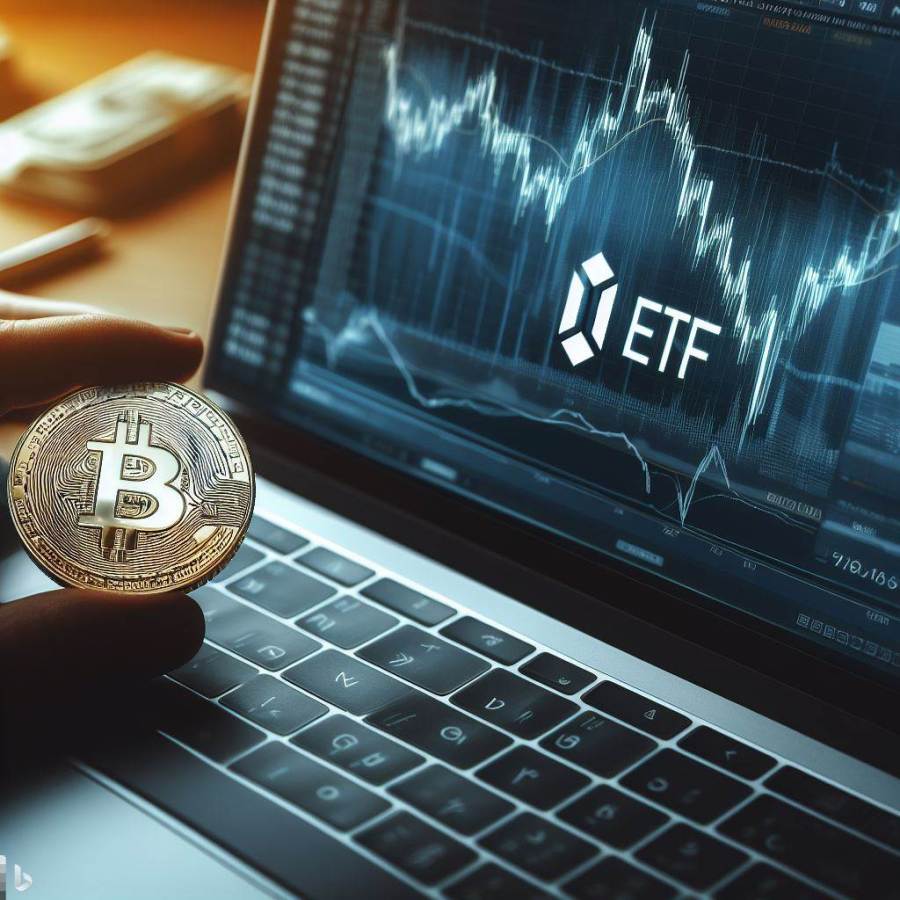What is a Spot Bitcoin ETF? It has been the talk of the town in crypto circles lately. But why is everyone so interested in this, and what does it mean? And, will it send the price of Bitcoin higher?
The first thing you need to know is that Spot Bitcoin ETFs are possibly about to be approved in the US.
So why does it matter if a spot Bitcoin ETF gets regulatory approval in the USA? Let’s start at the beginning.
In the beginning
First of all, Bitcoin is a digital currency that you can use to buy things online or send money to other people. Bitcoin is not controlled by any government or company, but by the people who use it. Bitcoin has a limited supply (the final number will be 21 million coins, there are currently 19.5 million in circulation).
An ETF, or exchange traded fund, is a type of investment that lets you buy and sell shares of a fund on a stock market. A fund is a collection of assets, such as stocks, bonds, gold and other things of value. An ETF tracks the price of these assets and gives people who buy into it a share of the profits or losses.
What is a Bitcoin ETF?
A Bitcoin ETF is an ETF that tracks the price of Bitcoin. It allows you to invest in Bitcoin without actually owning any coins. Instead, you buy and sell shares of the fund that holds Bitcoin, or contracts related to Bitcoin’s price. This way, you can benefit from Bitcoin’s price movements without having to worry about storing, securing or transferring your coins.
A Bitcoin ETF can make it easier and cheaper for more people to access Bitcoin as an investment. It can also provide more regulation and transparency for the cryptocurrency market. However, a Bitcoin ETF also has risks and challenges, which we detail below.
A certain type of Bitcoin ETF is already operating in the US. It is a futures-based Bitcoin ETF. A futures-based Bitcoin ETF tracks the price of Bitcoin through contracts that expire at a certain date, rather than holding actual Bitcoins. However the type of ETF large asset managers are hoping to get approved is called a spot Bitcoin ETF.

What is a spot Bitcoin ETF?
Imagine you want to buy some Bitcoin, but you don’t want to deal with the hassle of setting up a wallet, finding an exchange, and keeping your coins safe. You also don’t want to pay high fees or taxes for buying and selling Bitcoin. What if there was an easier way?
That’s where a Bitcoin spot ETF comes in. This ETF is like a bag of Bitcoin that you can buy and sell on the stock market, just like you would buy and sell shares in a company. The price of the ETF is based on the actual price of Bitcoin at any given moment, which is called the spot price. The ETF tries to match the spot price as closely as possible, so you don’t have to worry about paying more or less than the real value of Bitcoin.
A Bitcoin spot ETF has some advantages over buying Bitcoin directly. For example, you can use your regular brokerage account to trade the ETF, without needing any special software or hardware. You can also enjoy more regulation and protection from the government and the stock market. Fees and taxes are lower, as you’re not buying or selling actual Bitcoin, but shares in a fund that holds them.
However, the U.S. Securities and Exchange Commission (SEC) has been reluctant to approve a spot Bitcoin ETF, expressing concerns about market manipulation and fraud.

While a spot Bitcoin ETF can make it easier and cheaper for investors to invest in Bitcoin, it also has some risks:
The crypto is not yours
A Bitcoin spot ETF does not give you direct ownership or control of your Bitcoin. You are only buying and selling shares of a fund that holds them for you. This means you cannot use your Bitcoin for anything else, such as spending them online or sending them to other people.
Custody risk
A spot Bitcoin ETF holds actual Bitcoin in a trust, which means it has to store and protect the coins from hackers, thieves and accidents. This is called custody, and it is a big challenge for the crypto industry. You have to trust that the ETF provider will keep the underlying Bitcoin safe and secure, and that they will not run away with them, or lose them. If something goes wrong with the custody, you could lose your investment or face legal troubles.

Regulatory risk
In the US, the SEC has rejected many applications for spot Bitcoin ETFs, and it is still reviewing some others. There is no guarantee that the SEC will approve any spot Bitcoin ETF soon, or ever. If it does approve them, it could also change its mind. If the SEC changes its mind or imposes new rules or restrictions on spot Bitcoin ETFs, it could affect their availability, performance, or legality.
Price risk
A spot Bitcoin ETF tracks the real-time price of Bitcoin, which is known for its wild swings. These can happen at any time and for any reason. If you buy a spot Bitcoin ETF when the price is high, and then it drops suddenly, you could lose a lot of money.
Tax risk
A spot Bitcoin ETF could be taxed differently than buying Bitcoin directly. When you buy or sell Bitcoin directly, you have to report your gains or losses as capital gains or losses on your tax return. When you buy or sell a spot Bitcoin ETF, you have to report your dividends and capital gains differently.
What’s the difference?
A Bitcoin spot ETF is different from a Bitcoin ETF. A Bitcoin ETF can track other things besides the spot price of Bitcoin, such as companies that make blockchain technology. And, a Bitcoin ETF can give you more options and flexibility to invest in different aspects of Bitcoin and its ecosystem, but it can also be more complex and confusing than a simple spot Bitcoin ETF.
What is a Spot Bitcoin ETF? Conclusion
Will the SEC give approval for a spot Bitcoin ETF? Maybe. And if it does, it might send the price of Bitcoin upwards. And it is for this very reason that everyone is talking about it. But nothing is a given in the world of crypto, and as always, do your own research.





